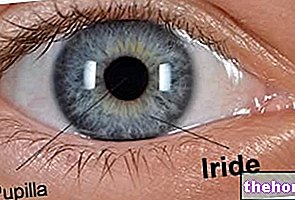Definition
Ocular herpes is a common infection of the eye, mainly caused by the Herpes simplex virus. Although a single episode of ocular herpes tends to resolve without any complications, in some cases the infection can cause scarring of the cornea or even worse, irreversibly impairing vision.

Causes and mode of transmission
Ocular herpes is mainly caused by an infection with the Herpes simplex virus type 1. The virus can be transmitted in several ways:
- Through contact with a person affected by cold sores, ocular or, less often, genital herpes
- Self-contamination: the spread of the virus can occur simply by touching the eyes with the hands after having scratched or rubbed a herpetic lesion (e.g. of the lips) during the contagious phase
- Reactivation of the virus: Ocular herpes, unfortunately, tends to recur more often in the same patient. As we know, once the infection is contracted, the herpetic viruses tend to hide along the nerve endings: here, they can remain silent for throughout life - therefore do not cause any symptoms - or recur on certain occasions. It has been observed that herpetic lesions tend to reappear in the presence of strong psychological and / or physical stress, or as a consequence of "excessive exposure to sunlight or a marked hormonal alteration (eg pregnancy).
In 40-50% of cases, ocular herpes patients show the same symptoms of the infection again.
Types of Ocular Herpes
According to the depth of the infection in the eye, several forms of ocular herpes are distinguished:
- Herpes keratitis: This is probably the most common corneal infection, affecting the superficial layer of the cornea. Generally, this type of ocular infection heals without scarring at the corneal level.
- Stromal keratitis: Herpes simplex-borne infection pushes deeper into the stroma (the middle layer of the corneal membrane). This infection is rather dangerous: when not adequately treated, in fact, it can cause scarring of the cornea, therefore a progressive alteration of vision up to blindness.
- Iridocyclitis: the ocular infection caused by Herpes Simplex reaches the iris and ciliary bodies. These internal ocular structures become inflamed, causing hypersensitivity to light (photophobia), blurred vision, ocular pain and redness of the eyes. Iridocyclitis is a particular type of viral uveitis.
- Retinitis: When the infection affects the retina or the innermost lining of the eye, ocular herpes is called herpetic retinitis.
Symptoms
For further information: Ophthalmic Herpes Zoster Symptoms
The symptoms with which simple ocular herpes begins are comparable to those of viral infectious conjunctivitis, ie pain, photophobia, blurred vision, abundant tearing and red eyes.
Rarely, common ocular herpes (superficial keratitis) causes irreversible damage or lacerations to the cornea.
The relapsing forms are generally more aggressive: Herpes, in fact, can cause deep corneal ulcers, permanent scarring and reduction / loss of vision. The presence of corneal ulcers almost always establishes a suspicion of Ocular herpes.
Differential diagnosis
Since the typical symptoms of ocular herpes are almost comparable to those of viral conjunctivitis, the differential diagnosis is essential to choose the most appropriate therapy.
A misdiagnosis exponentially increases the risk of Ocular Herpes recurrence
The diagnosis begins with the anamnesis: here, the doctor will carefully evaluate the symptoms reported by the patient and his clinical history, focusing in particular on the search for past herpetic infections.

The patient's eye is usually analyzed with an instrument called an ophthalmoscope, which is useful for examining the deepest part of the eye, the optic nerve and blood vessels. The slit lamp, on the other hand, is an instrument consisting of a light source and a magnifying glass which visualizes in detail the internal ocular structures: the slit lamp is therefore very useful for evaluating any abrasions / corneal ulcerations.
If glaucoma is suspected, the optician will carefully evaluate the internal eye pressure using a special instrument called a tonometer.
To ascertain the infectious agent in the hypothesis of an ocular herpes, the doctor can take a sample from the conjunctiva or ocular secretion for a subsequent cytological (cellular) laboratory investigation.
Treatment
The therapy for ocular herpes depends on the severity of the infection, or on the ocular structure involved (superficial cornea, deep cornea, retina, iris, etc.).
Superficial ocular herpes, even when associated with minor corneal ulcers, is easily eradicated with the application of eye drops or ophthalmic ointments with antiviral action. The most suitable drug for the treatment of ophthalmic herpes is Ganciclovir: the posology (dosage) involves instilling the drug in the form of eye drops in the eye 5 times a day, until the corneal ulcer regresses.
It is recommended that contact lenses be avoided during therapy for ophthalmic infection.
When needed, the doctor may also recommend the simultaneous oral administration (in tablet form) of antiviral drugs.
The use of cortisone-based eye drops is reserved exclusively for severe cases of ophthalmic herpes (involvement of the corneal stroma): in such circumstances, patients must strictly follow the instructions provided by the doctor. Excessive or inappropriate use of these drugs it can paradoxically aggravate symptoms.
If the doctor deems it appropriate, the patient can instill in the eye affected by Herpes Simplex a drop of antibiotic for prophylactic purposes only (to prevent a possible bacterial infection).
Surgery is necessary when corneal scars do not respond to drug treatments; in the presence of permanent corneal scarring induced by a "deep ocular herpetic infection, corneal transplantation is the only lifeline for preserving sight."
Read also: Remedies for "Ocular Herpes"

.jpg)


























